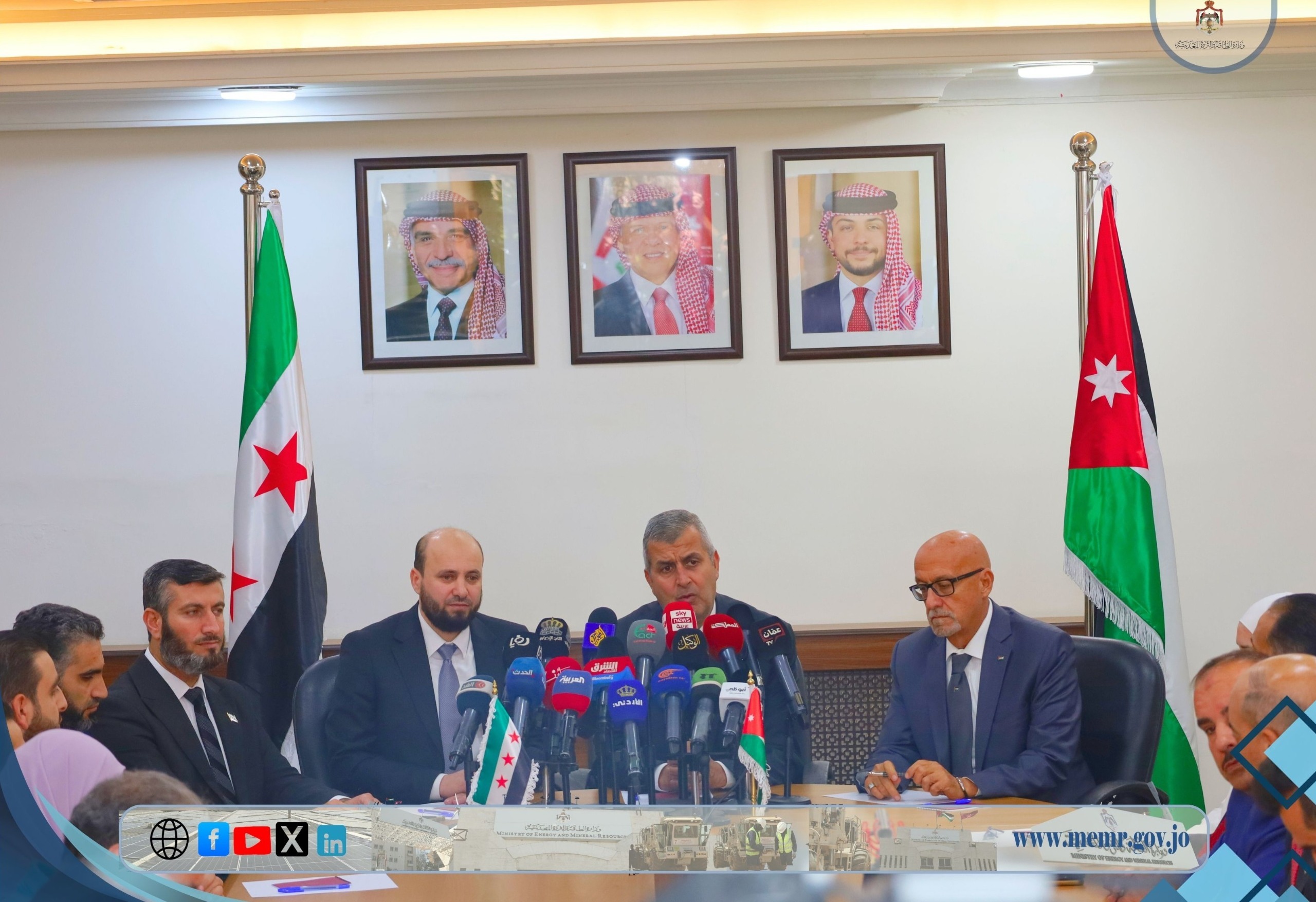
Photo Gallery
July 2, 2025 — Jordan’s Minister of Energy and Mineral Resources, Dr. Saleh Al-Kharabsheh, emphasized the importance of advancing bilateral relations in the energy and water sectors towards broader horizons to serve the mutual interests of both countries. His remarks came during a joint press briefing following extensive meetings with his Syrian counterpart, Eng. Mohammad Al-Bashir.
Minister Al-Kharabsheh stated that the discussions included in-depth talks on continuing and expanding the ongoing cooperation to supply natural gas to Syria for electricity generation. He also noted that the meetings explored potential trilateral cooperation between Jordan, Qatar, and Egypt in this area.
The two sides also discussed the electric power exchange project, as a follow-up to the recent visit to Damascus, including efforts to increase the capacity of the existing interconnection line, which the Syrian side is currently rehabilitating. Al-Kharabsheh indicated that communication is ongoing with the Arab Fund for Economic and Social Development to finance a related feasibility study, and both sides agreed to form a joint technical team to follow up on this file.
The meetings also covered topics such as electricity distribution, oil marketing, and the potential use of Jordan’s advanced infrastructure in petroleum storage and monitoring, particularly through government-owned companies like the “Jordan Oil Logistics Company” and the “Jordan Petroleum Refinery Company.”
Al-Kharabsheh stressed that Jordan, under the directives of His Majesty King Abdullah II, is placing all its technical and logistical capabilities at the disposal of its Syrian brothers.
On the topic of renewable energy, Al-Kharabsheh highlighted Jordan’s pioneering experience in the sector. He announced upcoming meetings between private sector companies from both countries to explore opportunities for cooperation and joint investment.
From his side, Minister of Water and Irrigation, Eng. Raed Abu Al-Saud, stated that water cooperation with Syria is witnessing a fresh start after years of stagnation. He noted that although the 2005 water agreement between the two countries was never fully implemented, there is now preliminary agreement to hold the first meeting of the joint Jordanian-Syrian technical committee on July 8 to discuss issues related to the Yarmouk River and water allocations.
Abu Al-Saud handed his Syrian counterpart an official letter regarding Agreement “3/9/7/8,” which includes a clause allowing for amendments. He clarified Jordan’s perspective on the proposed amendments discussed in 2021.
The minister expressed optimism about the Syrian response, citing a positive move by the Syrian government in drilling wells in the southern Dhara area. This helped reduce the pressure on groundwater in northern Jordan, especially following a good rainy season, reflecting a spirit of cooperation and Syria’s keenness to support Jordan in addressing its water challenges.
He also noted that the Syrian side is fully informed of the complex issues concerning the Zaydi Basin, the Jordan River, and the Ramtha Basin, and that these topics will be discussed in more detail in upcoming meetings.
In a related context, Syrian Minister of Energy Mohammad Al-Bashir confirmed that the World Bank has provided a grant to rehabilitate the electrical interconnection line on the Syrian side linking the two countries.
He added that an agreement was reached to increase the volume of gas supplied from Jordan to Syria, and that joint technical committees have been formed to review the water agreements between the two countries, including the Yarmouk Basin Agreement.
Minister Al-Bashir also affirmed that today’s meetings included extensive discussions with Jordanian renewable energy companies to explore the possibility of transferring Jordan’s experience to Syria. Separate sessions were also held with Jordanian companies interested in investing in the Syrian market, highlighting the high level of coordination between the two countries across various sectors.
In conclusion, the ministers affirmed that these meetings mark a new beginning toward a sustainable partnership based on the exchange of expertise and mutual interests. They expressed hope for deeper coordination and joint efforts between the two brotherly nations.